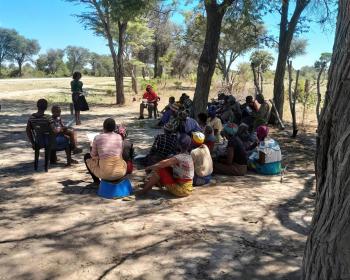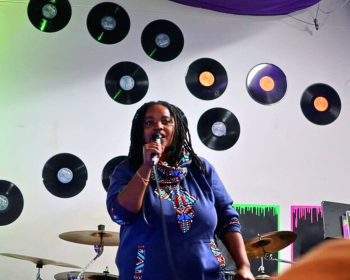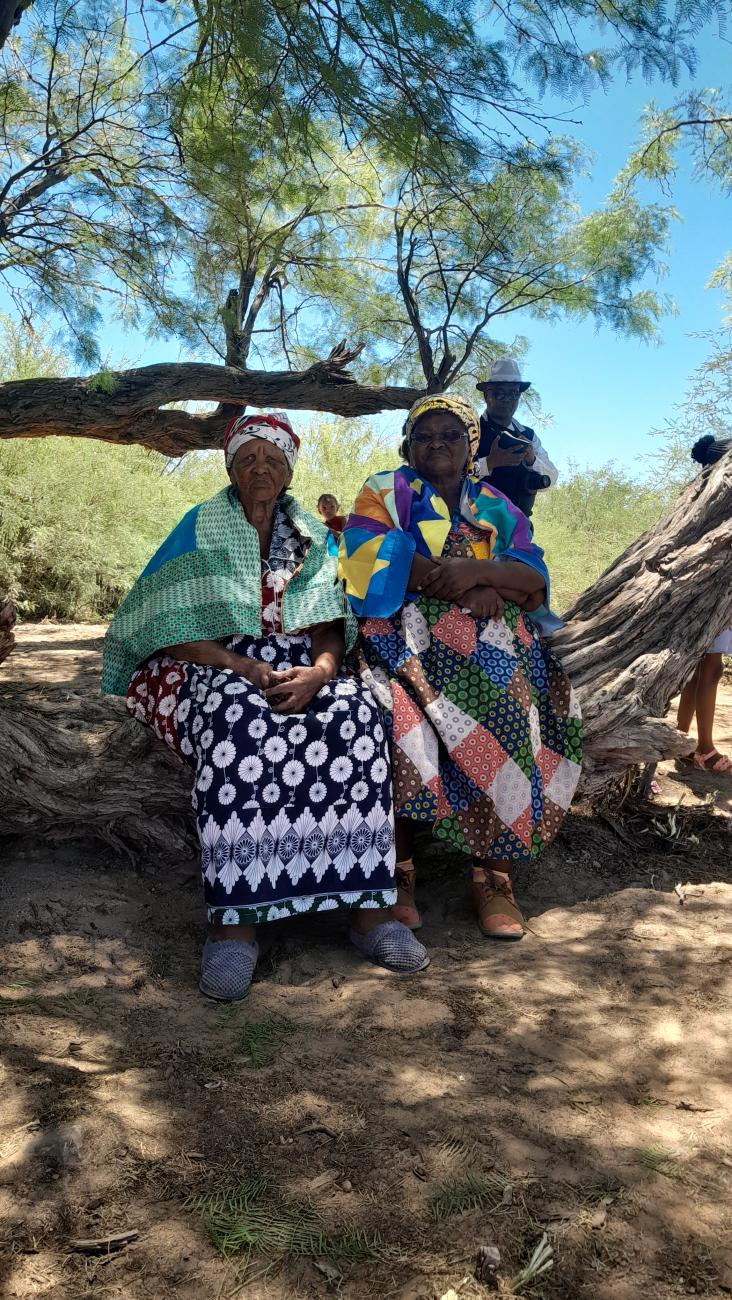
By Natalie-Jane Van Dieman
In the early hours on a Friday morning, our bus rolled quietly into the small town of Gibeon, Namibia. The air was heavy and warm, nearly 30º Celsius (86º F) even before sunrise. Children slept outside on steel frame beds with foam mattresses, the desert sky their only blanket needed. The stillness was interrupted only by our arrival, as we were met with open arms by Gaob (King) Hendrik Ismael Witbooi, the Goatara (Queen) Lidia Witbooi, and members of the Nama Royal House. Their welcome was both ceremonial and deeply personal. In that moment, I realized I was not just a visitor. I was returning to something my spirit had long known, but history had hidden.
I travelled as part of a cultural collaboration between Nama descendants of the community of Pella in Northern Cape, South Africa and as the project manager of a social enterprise founded in Macassar, Cape Town: I Krown Me Social Projects (Pty) Ltd., led by Captain Steven Witbooi (Nama), descendant of the Witbooi royal line. Together, we work across communities to advance food security, waste transformation, and Indigenous knowledge preservation, particularly in rural and township communities affected by poverty and systemic exclusion.
Our visit to Gibeon, and later to Pella, formed part of an ongoing cultural revitalization and sustainability project supported by the Cultural Survival’s Indigenous Community Media Fund. The project aims to document, protect, and strengthen the Nama language and identity while addressing urgent local challenges such as food and water insecurity that threaten daily survival and long-term resilience. The funds were used to facilitate cultural exchanges, host community dialogues, and explore regenerative development solutions that merge Traditional Knowledge with modern sustainability practices. For us, this journey was both professional and profoundly personal—a reconnection to Indigenous lineage, language, and land.
As a woman born and raised in the Cape Flats, my roots trace back to generations of people displaced and renamed by colonialism, genocide, and apartheid. My family’s history, like so many others, was wiped clean by force. Our languages were replaced, our lands stolen, our stories buried beneath decades of shame and survival.
Standing among the Nama Elders in Gibeon, I felt the echoes of that loss—and the possibility of healing it. Here was a People who had survived centuries of erasure, yet continued to speak, sing, and pray in the ancient tongue of their ancestors. The Nama language Khoekhoegowab, one of the oldest Khoekhoe dialects in southern Africa, carries not only words, but entire worlds. Each click, each tone, is an act of defiance, a declaration that despite everything, we are still here. As Ma Christine, an Elder from Gibeon, says, “This language keeps us together. Even when there is hunger, even when the rain does not come, we still speak. Because when we speak, we remember who we are.”
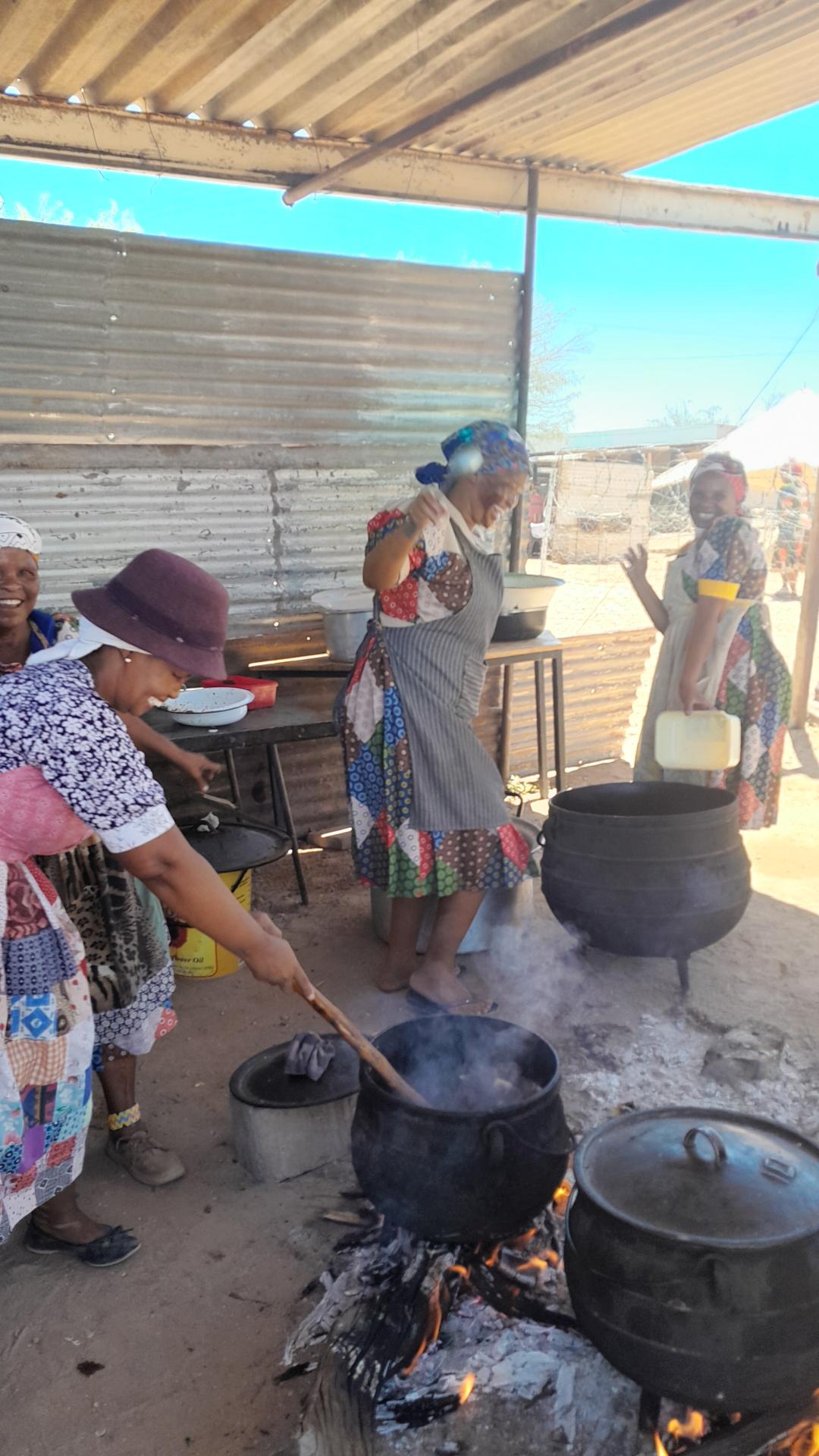
Two Communities, One Story
In Gibeon, the Nama language is still alive, spoken in homes, schools, and ceremonies. It is a source of pride and identity. In Pella, however, just across the Namibian border in South Africa, the language has largely been lost. Yet, through collaboration and support from the grant, efforts are underway to revive it through intergenerational storytelling, cultural workshops, and oral history documentation.
I witnessed young Nama kids in Gibeon listening intently to Elders from Pella who were rediscovering fragments of the old tongue, repeating phrases, laughing at mispronunciations, and celebrating every remembered word. This process of language reclamation is about more than speech: it’s about restoring self-worth, belonging, and continuity. “When I heard Bradley van Sitters in Cape Town speaking our Nama language during the home coming of ancestral remains from Scotland, my heart danced with joy and pride,” says Markus Kooper, an Elder and historic researcher.
Elder women spoke of the pain of forgetting, and the hope that their grandchildren might grow up with the confidence to name themselves in their true language. As one grandmother told me softly, “We may have forgotten the words, but not the feeling. The land still knows our names.”
Beyond the cultural work, what we encountered on the ground was sobering. Both Gibeon and Pella face severe food and water insecurity. Drought has become a recurring crisis, drying up riverbeds and killing small crops. Many families rely on limited food parcels, and access to clean drinking water is inconsistent. The landscape is strikingly beautiful—golden dust, endless sky—but it carries the scars of neglect.
In Pella, Elders described walking long distances to collect water and the heartbreak of watching livestock die during dry seasons. In Gibeon, community gardens struggle to survive under extreme heat and limited irrigation. The climate emergency, combined with historic underinvestment, has deepened vulnerability.
And yet, amid these challenges, I witnessed extraordinary resilience. Women’s groups in both communities are experimenting with small-scale food gardens, seed saving, and traditional drought adaptation techniques. Young people are learning about soil restoration and sustainable water harvesting. These are not just survival strategies; they are acts of cultural continuity, rooted in ancient ecological knowledge that sees the land as kin, not resource. “We plant because it reminds us that life still belongs here. Even when the ground is dry, we do not give up,” says Ma Doekie, an Elder from Pella.

Culture as a Solution
In both communities, I learned that culture itself is a solution. When people reconnect with their heritage, they reconnect with each other—and with the environment that sustains them. Traditional governance structures, like that of Goab Witbooi, serve as moral and cultural anchors. The revival of ceremonies, songs, and stories restores dignity and intergenerational purpose.Our organizations’ shared goal is to strengthen these community-led systems of care and governance, helping Indigenous leaders access training, funding, and networks without compromising their cultural autonomy. I Krown Me Social Projects continues to develop food sovereignty and waste-to-resource programs that could one day be adapted to support places like Gibeon and Pella, combining modern green innovation with Traditional Ecological Knowledge. “Our generation carries a duty to connect the wisdom of our ancestors with the innovation of today. True restoration happens when we bring the old and the new into balance,” says Captain Witbooi.
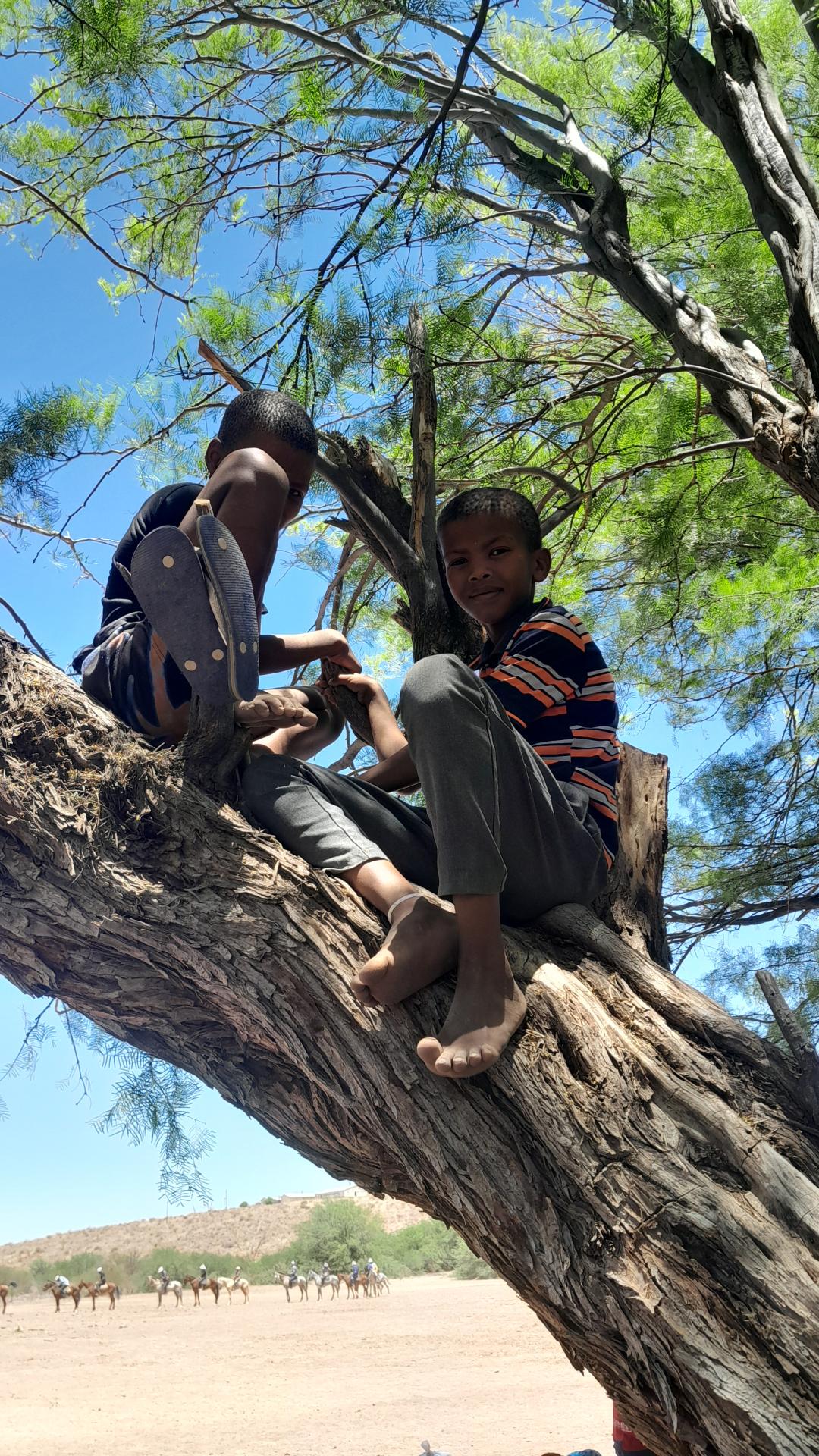
A Call for Support and Solidarity
The challenges facing the Nama Nation are not isolated. They reflect the broader struggles of Indigenous peoples across southern Africa. Government departments, private institutions, and civil society organizations must prioritize inclusive development frameworks that recognize Indigenous leadership and integrate cultural revitalization into national policy. Access to water, food, and education is a human right, but for Indigenous communities it is also a cultural right. Without them, language, ceremony, and land-based knowledge cannot survive. Sustainable solutions must therefore be co-created with Indigenous communities, not imposed upon them.
As a community organizer in Mitchell’s Plain, this experience reshaped how I see the connections between urban and rural Indigenous realities. Though the settings differ, the root causes of dispossession, erasure, and exclusion remain intertwined. Healing must happen on both sides of the border.
As our two weeks came to an end, I sat beneath the desert stars of Gibeon and felt a quiet peace settle in. I had not gone there to find my ancestors, yet somehow they had found me. I realized that reconnection is not about tracing perfect genealogies; it’s about honoring the living memory of a people who continue to rise, teach, and protect the earth that gave them birth.
The children I saw sleeping under the open sky are part of that living memory. Their laughter in the morning light reminded me that even in hardship, there is beauty, and even in loss, there is renewal. Reclaiming our Indigenous languages, securing our food and water, and restoring our dignity are not separate struggles. They are one story: the story of returning home. Keigangans (Thank you very much) to Cultural Survival.
Natalie-Jane Van Dieman is the Founder and CEO of Brother Nathan Foundation (Pty) Ltd., a South African social enterprise rooted in circular economy principles, Indigenous knowledge, and community empowerment. Based in Mitchell’s Plain, she works across rural and township communities to advance sustainability, food security, and cultural preservation. She also serves as Project Manager for I Krown Me Social Projects (Pty) Ltd. under the leadership of Captain Steven Witbooi (Nama).
